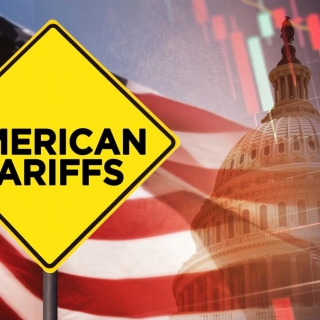


The US has signaled it will not relax its August 1 deadline for higher tariffs against the European Union as the bloc struggles to reach a deal on time.
Over the weekend, US Commerce Secretary Howard Lutnick said he was confident a trade deal with the EU could be reached, but cautioned that the deadline for the 30% base tariffs was fixed.
"That's a tight deadline, so on August 1, the new tariffs will go into effect," Lutnick said Sunday on CBS News when asked about his EU tariff deadline.
He did hint that negotiations could continue beyond that date, stating: "These are the two largest trading partners in the world, who are negotiating. We will reach a deal. I'm confident we will reach a deal."
"There's nothing stopping countries from negotiating with us after August 1, but they will start paying tariffs on August 1," he added.
The EU has stated it is preparing retaliatory action against the US if punitive trade tariffs are imposed. However, Lutnick dismissed the possibility of the EU targeting goods like Boeing aircraft and Kentucky bourbon, saying, "They wouldn't do that."
Final-day negotiations for a trade deal are underway, with the EU hoping to negotiate lower tariffs. The bloc hopes to reach a similar pact with the UK, which was the first country to conclude a trade agreement with the US. That deal included a 10% base tariff with several conditions regarding imports of cars, steel, and aerospace.
However, economists and analysts are increasingly skeptical about Brussels' ability to agree on a similar framework.
First, the EU has a much more complicated relationship with US President Donald Trump than with the UK. Trump has frequently complained about what he considers an unbalanced trade relationship and unfair trade practices, which the EU denies.
According to the European Council, total trade between the EU and the US reached 1.68 trillion euros ($1.96 trillion) in 2024. While the EU has a surplus in goods trade, it has a deficit in services. Overall, the bloc recorded a surplus of around 50 billion euros last year, when both goods and services are taken into account.
Last Friday, the Financial Times reported that Trump was pushing for minimum tariffs of 15% to 20% on EU imports in any deal with the bloc. The president was also reportedly happy to maintain import duties on the auto sector at 25%, a move that would severely hurt German car exporters.
Speaking to CNBC's "Europe Early Edition" on Monday, Arnaud Girod, head of economics and cross-asset strategy at Kepler Cheuvreux, said tariffs of 15% to 20% "would be a complete disaster for European exports."
"Additionally, coupled with the strengthening of the euro that we're experiencing... that would start to weigh heavily and seriously hurt European exports, and, of course, also potentially, you know, reignite some inflation concerns in the U.S.," he added.(alg)
Sumber: CNBC
Japan's annual inflation rate edged down to 2.9% in November 2025 from October's 3-month high of 3.0%. Core inflation stood at 3.0%, keeping the same pace as in October and aligning with estimates. Mo...
Goldman Sachs sees gold prices climbing 14% to $4,900 per ounce by December 2026 in its base case, it said in a note on Thursday, while citing upside risks to this view due to a potential broadening o...
The BRICS group of countries is increasingly being considered as an alternative for global diplomacy and cooperation amidst increasing tariff and protectionist policies from the United States. A numbe...
Applications for US unemployment benefits fell after a spike in the previous week, underscoring the choppy nature of the data at this time of year. Initial claims decreased by 13,000 to 224,000 ...
Annual inflation in the United States (US), as measured by the change in the Consumer Price Index (CPI), fell 2.7% in November, according to a report by the US Bureau of Labor Statistics (BLS) on Thur...
Oil prices are headed for a second weekly decline as concerns over a growing oversupply outweigh geopolitical risks to supply. Brent crude edged up to $60 a barrel on Friday but is still down about 2% for the week, while West Texas Intermediate is...
President Vladimir Putin said he is willing to discuss ending Russia's war in Ukraine, despite rejecting changes sought by Kyiv and Europe to the U.S. peace plan drafted with Moscow. Putin said he has "practically agreed" to the proposals to end...
Gold prices fell slightly on Friday (December 19), pressured by a stronger dollar and year-end investor positioning, but are poised to end the week higher as weaker US inflation data raised speculation of an interest rate cut. Spot gold prices...
 Fed Governor Christopher Waller said Wednesday that the Fed is in no rush to cut interest rates, given the current outlook, according to...
Fed Governor Christopher Waller said Wednesday that the Fed is in no rush to cut interest rates, given the current outlook, according to...
 The Bank of Japan (BOJ) is expected to raise interest rates on Friday to a three-decade high, from 0.5% to 0.75%, signaling readiness for further...
The Bank of Japan (BOJ) is expected to raise interest rates on Friday to a three-decade high, from 0.5% to 0.75%, signaling readiness for further...
 European stocks closed lower on Tuesday, with the STOXX 50 down 0.5% and the broader STOXX 600 slipping 0.4%, as optimism around Russia–Ukraine...
European stocks closed lower on Tuesday, with the STOXX 50 down 0.5% and the broader STOXX 600 slipping 0.4%, as optimism around Russia–Ukraine...
 Treasury Secretary Scott Bessent expects a substantial drop in inflation during the first six months of 2026, according to statements made Tuesday...
Treasury Secretary Scott Bessent expects a substantial drop in inflation during the first six months of 2026, according to statements made Tuesday...